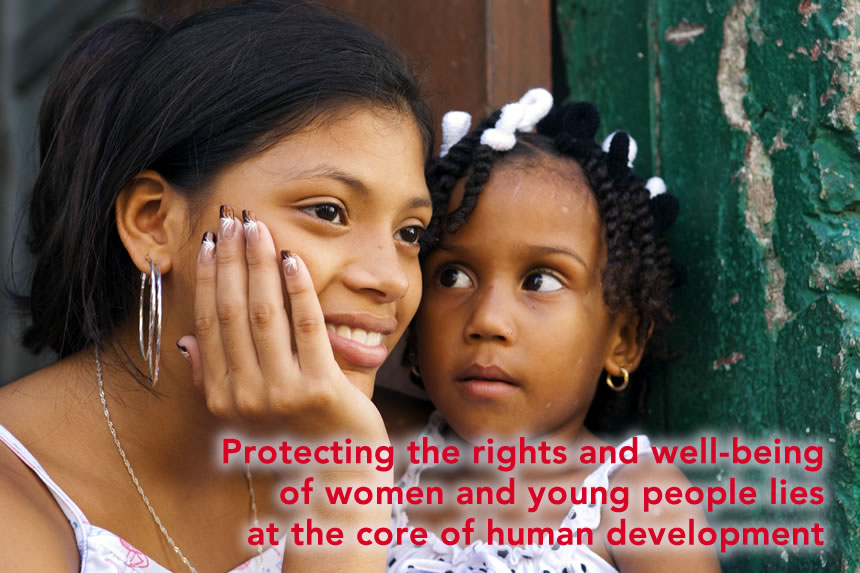Speech by Mrs. Mariela Castro Espin, Member of the Cuban Parliament, Director of the National Center for Sexual Education and member of the High Level Task Force for ICPD
Mr. Co-Chair,
My delegation fully endorses the speech given by the representative of the Plurinational State of Bolivia in the name of the G-77.
The promotion of equality, including social equity, gender equality and women’s empowerment are pending issues of the international agenda that are urgently needed.
We cannot speak about sustainable development when more than a billion people live under extreme poverty, while an unfair distribution of income increases. There will not be sustainable development if inequality lasts in the international economic relations. We cannot achieve sustainable development without a real political will directed to put an end to the deep gaps between rich and poor countries, if the existing gaps within each nation are not also eliminated, if there is not an agreed action to eradicate poverty that mainly affects women, girls and boys, young people and other vulnerable groups. There will not be sustainable development if the right for development is not guaranteed in most of the UN member states.
Ending inequality from the national and international scenarios must be sustainable development goal. Its specific targets and means for implementation must be an essential part of this group’s precise recommendations.
As mentioned in the presentations by other speakers that we deeply appreciated, the promotion of social equity and women’s equality must be acknowledged as fundamental human rights. The right to life without exclusion, to health services and to free education, I insist, free of charge and with the needed quality, it’s an essential and indisputable condition for development. If not, it cannot be considered a right.
Facts speak for themselves: everyday 800 women die due to preventable pregnancy and child birth complications; 80 million unwanted pregnancies, 30 million unplanned births and 20 million unsafe abortions are reported, mainly in developing countries where one in three girls under 18 years old also marries without her consent. Every year 16 million girls and adolescents give birth in countries with low and medium incomes, where maternal death is the main cause of death of this age group, while in other nations femicide is among the principal causes of women’s death.
In order to change the current dramatic situation, we should promote a new development agenda that includes:
a) Sexual and reproductive health and rights.
b) Women and girls rights and empowerment, as well as gender equality and ending violence towards them.
c) Adolescents and young people’s empowerment, including the access to a comprehensive sexual education and the related services.
d) Programmatic and financial means that accelerate the implementation of the pending agenda of Cairo’s Action Program. So, whenever the question of what strategy we must follow emerges, I always recall that we have this program. Its pending issues must be targets to achieve with specific indicators.
Mr. Co-Chair:
A comprehensive sexual education is a resource for the full emancipation of the human being that contributes to their formation as individual subjects to the law, on the basis of the demystification of dominant judgments and prejudices that exist in every society and that are the reasons of why it must be inclusive.
It’s inadmissible that in the XXI Century women rights continue to be violated and that after so many speeches, conventions, and international consensus, in most countries women receive lower wages than men by doing the same job; that they are forced to choose between death and jail when they need to terminate an unwanted pregnancy. That situation shows the permanent patriarchal domain that does not recognize and violates our capacity and fundamental human right of deciding over our own lives.
Women are no longer willing to be condemned to death by burning at the stake for heresy and witchcraft, using euphemisms of contemporary language expressed in laws and policies that violate our rights and undermine the social transformation processes.
In order to change women’s condition, we must change men’s because gender is a related category. Both women and men should benefit from educational actions that break apart the dominant mechanisms that resist changing.
We cannot advance from isolated initiatives from individuals, institutions or countries. We cannot also speak about family’s responsibility as an abstract, if it continues to reproduce the same patriarchal domination models.
If there is not a policy that establishes new values for the change in the intergender and intergenerational power relationships within the family, we are not contributing to women’s, girls’ and young people’s human rights.
If we honestly pretend that the post 2015 development agenda contributes solutions to the social equity, gender equality and women’s empowerment problems, from an indivisible and interrelated human rights perspective, member states will have to express their political will in concrete changing actions internally and globally.
Thank you very much.

